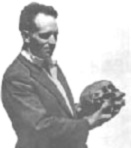Museum
|
Extracts from their leaflet Fish Hoek Farm: The land was granted to Andreas Bruins in 1818. It was sold several times before being bought by Hester Sophia de Kock in 1883. In 1901 she amrried Jacob Isaac de Villiers. After their deaths the land was sold off in plots, the first sale taking place in 1918. This was the beginning of the town of Fish Hoek. The faremhouse on the site of the present Homestead Naval Mess near the railway crossing became an hotel. The original building burned down in 1947. Whaling Open boat whaling took place in Fish Hoek from 1817 to 1868. Nowadays the whales know that it is safe to come into False Bay and the Southern Right Whale comes into the bay to calve. Other types of whale can also be seen from about August to the end of November. Fishing In the early days of European settlement False Bay was teeming with fish. Trek fishing has taken place ever since. Harders and yellowtail are the fish most frequently caught but nowadays in greatly reduced numberes. "Trek" is dutch for pull and refers to the pulling in of the net. "Dry" Fish Hoek The 1818 grant of land stated that there should be no public winehouse and this was carried over to the new town. The residents of Fish Hoek were determined to keep bottle stores out of the town. In 1956, after having opposed many license applications they formed an association called The Defenders of Fish Hoek. They succeded in getting the Liquor Act amended so that no further applications would be allowed. Under our new Constitution the Act fell away and after consultation with the local Magistrate residents voted for restaurant and bar licenses only. Mountain View The original barn of the Fish Hoek Farm now called Mountain View can be seen in Cottage Lane. It has been converted into two cottages and is not open to the public. De Villiers Graveyard Hester and Issac de Villiers, with other members of their family are buried in the small graveyard next to the NG Kerk (Dutch Reformed Curch) in Kommetjie Road Peers Cave  In 1926/7 Victor Peers and his son, Bertie excavated the cave now known as Peers Cave. They found many stone tools and the remains of nine people, one of whom became famous as Fish Hoek Man. The skull has the largest brain area of any skull of its age found up until that time. It has been dated at 12,000 years old. In 1926/7 Victor Peers and his son, Bertie excavated the cave now known as Peers Cave. They found many stone tools and the remains of nine people, one of whom became famous as Fish Hoek Man. The skull has the largest brain area of any skull of its age found up until that time. It has been dated at 12,000 years old.
|
 |
|
Fish Hoek Valley Museum
Opening hours:
|
||


Contact Us
- E-mail:
webmaster@fishhoek.com - Phone/Fax:
+27 021 782 7820
Linking Info
- Add/Amend a link here
- Advertise on this site